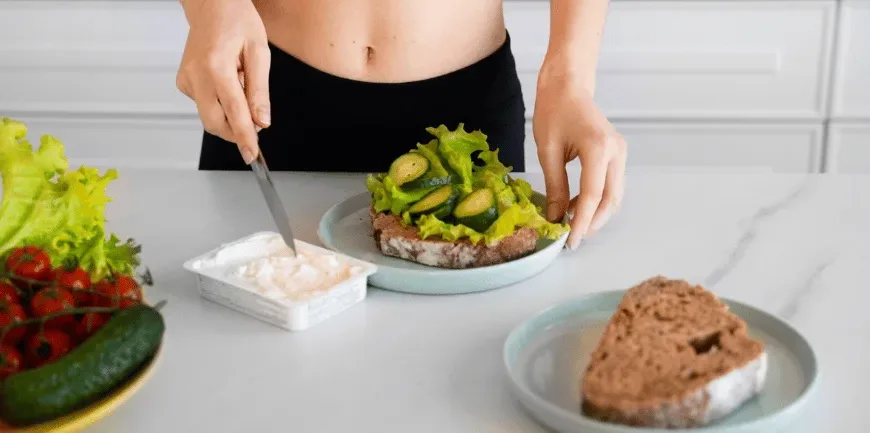After your liposuction procedure, you’re on the exciting path to a new, sculpted contour. As you focus on recovery, one of the most common and important questions patients ask is, “Is there a specific diet I should follow after liposuction?”
While there isn’t a rigid, trademarked “Liposuction Diet,” there is absolutely a highly recommended way of eating that is broken into two critical phases: The Healing Phase and The Maintenance Phase.
At Luxe Aesthetic Surgery, we guide our patients through this entire process. A proper diet is one of the most powerful tools you have to accelerate healing, minimize discomfort, and protect your beautiful results for life.
Phase 1: The Healing Diet (First 2-4 Weeks)
The primary goal of your diet in the weeks immediately following surgery is to support your body’s recovery process. Your focus should be on providing the essential nutrients needed to repair tissue, minimize inflammation, and reduce swelling.
Focus on These Healing Foods:
-
Lean Protein: Protein is the fundamental building block for tissue repair. Aim for sources like chicken breast, fish, turkey, beans, tofu, and eggs.
-
Vitamins & Antioxidants: Colorful fruits and vegetables are packed with vitamins like Vitamin C (crucial for collagen production) and antioxidants that fight inflammation. Think berries, leafy greens, broccoli, and bell peppers.
-
Healthy Fats: Anti-inflammatory fats can help manage swelling. Good sources include avocado, nuts, seeds, and olive oil.
-
High-Fiber Foods: Anesthesia and pain medication can cause constipation. Combat this with high-fiber foods like oats, brown rice, apples, and lentils.
-
Plenty of Water: Hydration is non-negotiable. Water helps flush out anesthesia, reduce swelling, and transport nutrients throughout your body.
Limit or Avoid These to Reduce Swelling:
-
Excess Sodium: Salt is the biggest contributor to water retention and swelling. Avoid processed foods, canned soups, fast food, and heavily salted snacks.
-
Processed Sugar & Refined Carbs: These can promote inflammation, which can hinder your healing process. Limit sweets, white bread, and sugary drinks.
-
Alcohol: Alcohol dehydrates you, can increase bleeding risk, and interferes with pain medication. It should be completely avoided for at least two weeks post-op.
Phase 2: The Maintenance Diet (For Life)
Once the initial healing phase is over, your nutritional focus shifts to preserving your incredible new shape. This is where you protect your investment. The goal now is to maintain a stable weight to ensure your results remain spectacular for years to come.
This isn’t a restrictive “diet” but rather a sustainable, healthy lifestyle. The principles are simple:
-
Balanced Macronutrients: Continue with a diet rich in lean protein, complex carbohydrates, and healthy fats.
-
Mindful Portions: While the fat cells removed are gone forever, the remaining ones can still expand. Be mindful of your caloric intake to prevent new weight gain.
-
Whole Foods Focus: Make whole, unprocessed foods the foundation of your diet. This naturally keeps your intake of sugar and sodium low.
Comparison: Healing Diet vs. Maintenance Diet
This table clarifies the simple shift in focus between the two phases.
| Feature | The Healing Phase Diet (First 2-4 Weeks) | The Maintenance Phase Diet (Lifelong) |
| Primary Goal | Accelerate tissue repair & reduce swelling. | Maintain a stable weight & protect results. |
| Protein Focus | High intake to provide building blocks for healing. | Normal, sufficient intake to maintain muscle mass. |
| Sodium Intake | Strictly limited to minimize post-op swelling. | Mindfully low to promote overall health. |
| “Treat” Foods | Best avoided to reduce inflammation. | Enjoyed in moderation as part of a balanced lifestyle. |
Expert Guidance from Southern California’s Top Clinic
Navigating your recovery is a crucial part of your surgical journey. Patients seeking the best liposuction surgeon in Los Angeles trust Luxe Aesthetic Surgery because our care extends far beyond the operating room. We provide detailed nutritional guidance to help you achieve the best possible outcome. Whether you’ve had traditional liposuction at the Best Liposuction Clinic in Santa Barbara area or advanced hi-definition liposuction Beverly Hills style, a smart diet is key to realizing the full potential of your procedure.
Frequently Asked Questions (FAQ) About Post-Liposuction Diet
-
Why am I so bloated and swollen after lipo?
This is a normal inflammatory response. Your body sends fluid to the treated areas to heal them. A low-sodium diet and proper hydration are the best ways to help your body flush this excess fluid. -
How long do I need to follow the strict “healing diet”?
For most patients, the intensive focus on healing nutrition is for the first 2 to 4 weeks. After that, you can transition to a more flexible, long-term maintenance plan. -
Will drinking protein shakes help my recovery?
They can be a convenient way to increase your protein intake, especially if your appetite is low in the first few days. Choose a high-quality shake that is low in sugar. -
When can I drink alcohol again?
You must wait until you are completely off all prescription pain medication and have been cleared by your surgeon, typically around 2-3 weeks post-op. -
What if I’m constipated after surgery?
This is very common due to anesthesia and pain medication. Increase your intake of water and high-fiber foods. If the problem persists, ask your surgeon about a gentle, over-the-counter stool softener. -
Do I have to “diet” forever to keep my results?
You don’t have to be on a restrictive diet forever. You simply need to adopt a healthy, balanced lifestyle to maintain a stable weight. The freedom comes from knowing your stubborn problem areas are gone for good. -
Is a specific diet like Keto or Paleo good after liposuction?
The best diet is one that is balanced and sustainable for you. While some diets may help with weight, your primary focus should be on whole foods, lean protein, and plenty of vitamins. Discuss any restrictive diet plans with your surgeon first. -
Can I drink coffee after liposuction?
Yes, in moderation. Coffee can be dehydrating, so ensure you are also drinking plenty of water. -
Will certain foods help the lumps and bumps go away faster?
While no food will magically erase lumps (which are normal post-op swelling and fibrosis), an anti-inflammatory diet rich in antioxidants and healthy fats can help your body resolve them more efficiently. -
What are some easy, post-lipo meal ideas?
Think simple: grilled salmon with steamed asparagus and quinoa; a smoothie with protein powder, spinach, and berries; or a hearty lentil soup. -
How much water should I really be drinking?
Aim for 8-10 glasses of water per day, or enough to keep your urine pale yellow. This is crucial for reducing swelling. -
Can I have a “cheat meal” during my recovery?
In the first 2-3 weeks, it’s best to be strict to give your body the best chance to heal. After that, incorporating occasional treats into a balanced lifestyle is perfectly fine and helps make it sustainable. -
Will I lose more weight by dieting after liposuction?
You may lose some water weight as swelling subsides. However, liposuction is not a weight-loss tool. The goal of your post-op diet is healing and weight maintenance, not further weight reduction. -
Why do I need to maintain a stable weight?
Because the remaining fat cells in your body can still grow larger. A stable weight ensures that the beautiful new proportions created by your surgeon remain visible and defined. -
What’s the number one diet mistake patients make after lipo?
The biggest mistake is reverting to old, unhealthy eating habits after the initial recovery. This can lead to weight gain that masks your beautiful results. Thinking of your diet as a permanent lifestyle change is the key to success.
Your Partner in a Lifelong Result
Your diet is an active, powerful part of your liposuction journey. By fueling your body correctly, you not only ensure a faster, more comfortable recovery but also safeguard the stunning, confidence-boosting results you’ve invested in.
Ready to learn more about how liposuction can reshape your life? Schedule your private consultation at Luxe Aesthetic Surgery today.

